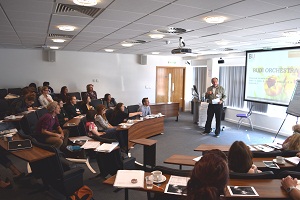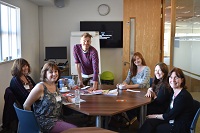
On Wednesday 30th September, the Bournemouth University Dementia Institute (BUDI) hosted a Masterclass on creative approaches in dementia. This was the third in a series of four Masterclasses set for the 2015 calendar year. We provided a day full of information and inspiration on the use of a range of creative activities with people with dementia. The morning included sessions on the importance of engaging people with dementia in creative activities, how much residents in a care home are engaged in meaningful activity on a daily basis, and the use of gardening and nature for wellbeing. As well as presentations from the BUDI team we also benefited from presentations from a professional artist, photographer, poet, and musician.
The afternoon was a series of workshops that gave delegates an opportunity to try out some of the activities and explore how they might facilitate people with dementia and their carers in activities such as music, poetry, visual art, photography, and drama. Such creative arts were used not only to demonstrate how we can engage people with dementia in meaningful activities, and the creative ways that we can make use of the creative arts, but how we can also use the arts to challenge the public’s perceptions of the capabilities of people with dementia.

Feedback from delegates has been very positive and we look forward to providing the next Masterclass in a few months!
Next Masterclass:
Wednesday 2nd December:
Promoting Wellbeing at the End of Life
Report by Dr Samuel Nyman, BUDI











 REF Code of Practice consultation is open!
REF Code of Practice consultation is open! BU Leads AI-Driven Work Package in EU Horizon SUSHEAS Project
BU Leads AI-Driven Work Package in EU Horizon SUSHEAS Project Evidence Synthesis Centre open at Kathmandu University
Evidence Synthesis Centre open at Kathmandu University Expand Your Impact: Collaboration and Networking Workshops for Researchers
Expand Your Impact: Collaboration and Networking Workshops for Researchers ECR Funding Open Call: Research Culture & Community Grant – Apply now
ECR Funding Open Call: Research Culture & Community Grant – Apply now ECR Funding Open Call: Research Culture & Community Grant – Application Deadline Friday 12 December
ECR Funding Open Call: Research Culture & Community Grant – Application Deadline Friday 12 December MSCA Postdoctoral Fellowships 2025 Call
MSCA Postdoctoral Fellowships 2025 Call ERC Advanced Grant 2025 Webinar
ERC Advanced Grant 2025 Webinar Update on UKRO services
Update on UKRO services European research project exploring use of ‘virtual twins’ to better manage metabolic associated fatty liver disease
European research project exploring use of ‘virtual twins’ to better manage metabolic associated fatty liver disease